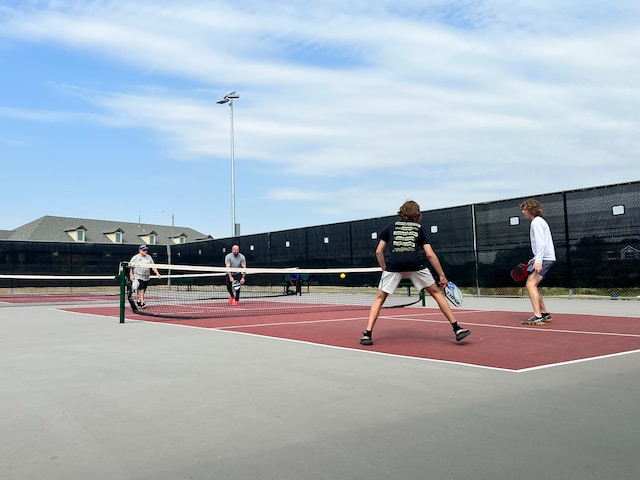Pickleball has been touted as the fastest-growing sport in America. An astonishing 36.5 million Americans played pickleball between August 2021 and August 2022, up from just 4.2 million players in 2020. Pickleball is like a cross between tennis, Ping-Pong, and paddleball that’s played with a wiffle ball on a court that’s less than half the size of a tennis court. Many players are thrilled about the physical health benefits from dinking (hitting a soft shot over the net), driving (hitting a hard-driven ball), and dropping (hitting a shot from the baseline that drops just over the net) on their opponents. But even better, pickleball is highly beneficial for brain health. As a brain health expert, that makes me very happy. Take a look at six ways pickleball boosts brainpower:
1. Pumps Up Blood Supply To The Brain
Pickleball can really get you moving, and a 2022 study in Science & Sports found that compared to walking, playing doubles in pickleball increases mean heart rates by 14 percent and peak heart rates by 19 percent. Basically, pickleball is considered an aerobic sport, and whenever you get your heart pumping, you get more blood flow to your brain. More blood flow means more oxygen, more glucose (aka energy), and more nutrients to fuel your brain. One of the brain regions that benefits the most from aerobic exercise is the prefrontal cortex, or PFC. It’s responsible for focus, forethought, decision-making, and controlling impulses. A high-functioning PFC is associated with greater happiness and success in all areas of life.
2. Heightens Function In The Cerebellum
Playing pickleball requires a lot of coordination and quick reflexes. It all increases activity in an area of the brain called the cerebellum. Situated at the back of the brain just above the neck, the cerebellum plays a role in processing speed, or how quickly your brain can handle mental tasks. It’s also involved in cognitive flexibility, which makes it easier for you to cope when plans change or you get an unexpected work project at the last minute. Having healthy levels of activity in the cerebellum enhances both processing speed and cognitive flexibility.
3. Increases Brain Volume
When it comes to the brain, size matters! The brain’s gray matter is involved in memory, movement, and emotions, and the more of it you have the better. Playing sports, such as pickleball, can help. A study in the Journal of Science and Medicine in Sport reported that exercises that involve forethought – say, planning to lob a pickleball over your opponent’s head or smack one down at their feet – combined with coordinated actions increases gray matter volume. Other research shows that aerobic exercise like pickleball boosts volume in the hippocampus, a brain structure that plays a significant role in memory formation.

4. Boosts Mood-Enhancing Neurochemicals
Physical activity triggers the release of feel-good brain chemicals, including dopamine and serotonin. Research shows that aerobic exercise also increases levels of the essential amino acid tryptophan, which is a precursor to serotonin. The bottom line is that recreational sports, such as pickleball, can boost moods and calm anxiety. Some studies show that exercise is as effective as antidepressants.
5. Increases BDNF
The human brain is constantly changing, and it tends to shrink with age. A protein called brain-derived neurotrophic factor (BDNF) is involved in neurogenesis, or the birth of new neurons. Research shows that heart-pumping exercise, such as pickleball, boosts BDNF. More brain cells mean more protection against cognitive decline. For example, a 2018 study points to new neurons in brain regions involved in memory.
6. Protects Against Brain Aging
Group recreational sports like pickleball provide opportunities for socialization, which is good for the brain. Maintaining strong friendships into your golden years helps keep the brain young and protects against cognitive decline. A study in Plos One looked at SuperAgers – individuals in their eighties who have the memory and cognitive performance of people two or three decades younger. Their findings showed that SuperAgers tend to have stronger social ties. Other research on mice found that the brains of mice living in groups looked younger compared to those that lived alone.
Playing group recreational sports like pickleball can be beneficial for the brain in so many ways. And it is getting easier to find places to play pickleball as courts are popping up in towns across America. Of course, it’s always a good idea to check with your physician before beginning a new form of exercise.
Author Bio
Daniel G. Amen, MD is a physician, board-certified child and adult psychiatrist, award-winning researcher, 17-time bestselling author, and in-demand speaker. He’s Founder and CEO of Amen Clinics, which holds the world’s largest database of functional brain scans relating to behavior. He’s lead researcher on a landmark brain imaging and rehabilitation study on pro football players. He’s been on health-related podcasts, television programs, books, articles, music albums, and movies; and made numerous court and public appearances. His new book is Change Your Brain Every Day: Simple Daily Practices to Strengthen Your Mind, Memory, Moods, Focus, Energy, Habits, and Relationships.


































